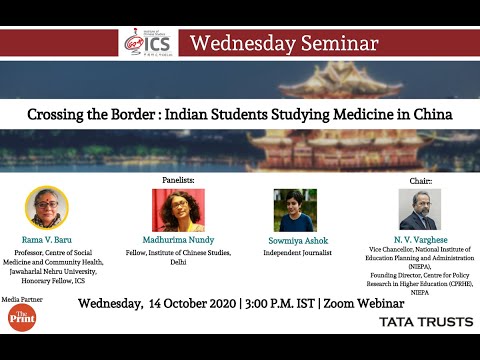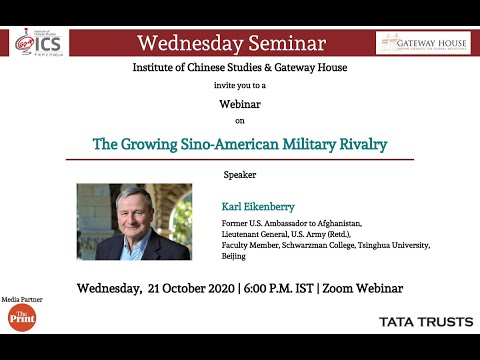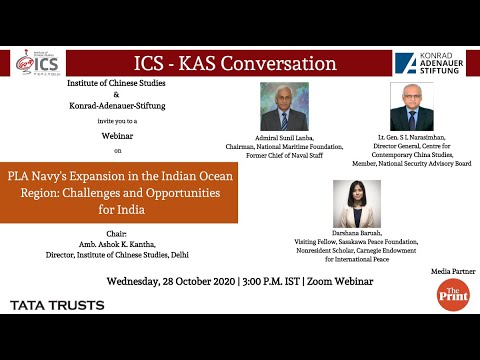.jpg) |
| |
| ICS Conversation | Hong Kong’s Autonomy after the National Security Law: Challenges and Perspectives |
|
Sebastian Veg, Victoria Tin-bor Hui, Samson Yuen, Ilaria Maria Sala
Special Lecture | Zoom Webinar | 1 October 2020
|
| |
|
The coming into force of the National Security Law (NSL) in Hong Kong on 30 June 2020 - enacted by the Standing Committee of China’s National People’s Congress - marks a decisive phase in the region’s political future. With the passage of NSL, circumventing Hong Kong Special Administrative Region’s (HKSAR) own legislature, the constitutional principle of ‘One Country Two Systems’ that provides significant autonomy to the region has also come under question. Since Britain’s handover of Hong Kong to China on 1 July 1997, the region has witnessed different phases of discontent over a range of issues. The cornerstone of the discontent has been apprehensions and anxieties over direct control by the Mainland. The tide of protests has increased over the last year, especially surrounding the proposed bill that sought to legalize extradition of people to China. The NSL has been widely criticized, as it underlines direct control over the region, and criminalizes dissent and protest actions. With significant punitive ramifications, the law also carries implications beyond Hong Kong and China’s territorial jurisdictions. Focussed on these developments, this panel discussion analyzed how they are reshaping state-society relations in HKSAR. The panelists delved into the political, economic and social implications of these developments for the region’s future. The discussion also attempted to throw light on the possible coping strategies and responsive measures of the democracy movement in Hong Kong.
. |
| Watch> |
|
|
.jpg) |
| |
| V P Dutt Memorial Lecture | India as a Teacher by Negative Example: Chinese Perceptions of India during the British Colonial Period and their Impact on Contemporary India-China Relations) |
|
Amb. Shyam Saran
Special Lecture | Zoom Webinar | 7 October 2020
|
| |
|
The history of ancient civilizational links between India and China, including the spread of Buddhist religion and philosophy from India to China, are often cited as the enduring basis for India-China friendship. However, contemporary India-China relations have been much more influenced by Chinese encounters with British imperialism, with Indians playing the role of subordinate instruments of British depredations in China, including the dumping of opium on China. India was held up by Chinese intellectuals as a teacher by negative example, its easy subjugation by the British being the result of its stagnant and stratified society, its fragmented and disunited polity and a slavish temperament among its people. China would need to avoid these dangers if it were to regain its full independence and modernisation. These perceptions persist and influence Chinese policy towards India in contemporary times and need careful analysis.
. |
| Watch> |
|
|
.jpg) |
| |
| Assessment of Abe Era and the Road Ahead |
|
Prof. Srabani Roy Choudhury
Special Lecture | Zoom Webinar | 9 October 2020
|
| |
|
Shinzo Abe’s resignation came at a time when Japan was reeling under the impact of COVID-19, which brought forth the inefficiency of the public health system and the slide of the economy which was just about tottering its way into positive growth. Abe’s prime ministerial journey has given strong directions to Japan’s economic recovery through Abenomics, his manifesto had looked at constitutional changes, and in the international arena, he had progressively attempted to give Japan an independent direction from the alliance system. Abe’s departure thus requires an assessment of what he had designed to achieve and how well we can score his report card. Since his tenure has deepened India-Japan relations, at this juncture, it necessitates an appraisal of this relationship. Besides reflecting on Abe’s policies, it is also opportune to ponder over what is the task in hand for Prime Minister Sugo.
. |
| Watch> |
|
| |
 |
| |
| Crossing the Border: Indian Students Studying Medicine in China |
|
Rama V. Baru, Madhurima Nundy, Sowmiya Ashok
Wednesday Seminar | Zoom Webinar | 14 October 2020
|
| |
|
The mobility of Indian students travelling abroad for professional higher education has been on the rise since the early 2000s. The favoured destinations have been the US, Canada, Europe and Australia. However, in recent years China has been one of the top non-English speaking countries where students are going for higher education, mostly for undergraduate medical courses. The talk focused on the pull and push factors of Indian students travelling to China for an undergraduate course in medicine, based on interviews conducted with Indian students, faculty and government representatives in China. It attempted to understand: the students’ experiences and expectations; the structure of medical education in China; specific challenges and barriers that students confront in China and on their return.
. |
| Watch> |
|
|
 |
| |
| The Growing Sino-American Military Rivalry |
|
Lt. Gen. Karl Eikenberry
Wednesday Seminar | Zoom Webinar | 21 October 2020
|
| |
|
The United States and China together now account for over one-half of the world's defense spending. In recent years, Sino-American military competition has intensified in the contested waters of the Western Pacific, with the South China Sea and Taiwan both potentially dangerous flashpoints. The People's Liberation Army is also developing global capabilities to support the PRC's Belt Road Initiative, posing challenges to nations beyond the Asia-Pacific region. Efforts to mitigate the risks posed by these developments are complicated by the diverging geopolitical interests of Washington and Beijing, and both sides' quests for military technological superiority which encourages economic decoupling. Karl Eikenberry, whose military, diplomatic, and academic careers have included numerous postings and projects in China and East, South, and Central Asia, discussed the state of the U.S.-China military rivalry and the factors that will shape its future course.
. |
| Watch> |
|
|
 |
| |
| ICS-KAS Conversation | PLA Navy’s Expansion in the Indian Ocean Region: Challenges and Opportunities for India |
|
Adm. Sunil Lanba, Lt. Gen S L Narasimhan, Darshana Baruah
Special Lecture | Zoom Webinar | 28 October 2020
|
| |
|
The People’s Republic of China aspires to build a “modern socialist country that is prosperous, strong, democratic, culturally advanced and harmonious” by 2049. Widely considered as a euphemism for a “Global Power”, the Chinese Dream (中国梦) envisages China claiming its rightful role in the global stage after more than a ‘Century of Humiliation’. Commensurate with the national goal, the People’s Liberation Army aspires to be a ‘world class’ military by 2049. Of particular importance is the PLA Navy (PLAN) which has grown from a 'brown water' Navy to the 'largest' Navy in the world in just three decades, defying conventional modelling and predictions. The growth of the PLAN is prominent in the Indian Ocean Region (IOR), where it has a near-permanent presence with a logistics base at Djibouti, counter-piracy patrols, and a growing footprint that necessitates critical examination. This webinar delved into current and future developments in the PLAN that are of concern to India. The broad themes of discussion are current capabilities of the PLAN in the IOR, likely PLAN force projection and posture by 2035, and perspective planning for countering PLAN operations in the IOR.
. |
| Watch> |
|
|









